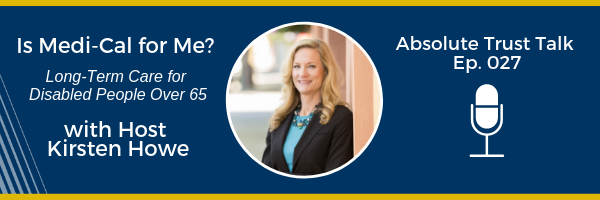This is another installment in our series on Medi-Cal planning. In this blog post we focus on one particular planning tool: transfers.
Before we can create a plan for transferring our client’s assets we have to consider several additional Medi-Cal planning concepts, which we explore in this article.
- Look-Back Period
On the Medi-Cal application we are required to list all transfers that have been made for less than full value in the last 30 months (or 60 months if transfers were made to a trust). Transfers for less than full value essentially means gifts – any time we gave someone something and got little or nothing in return. When you go to the grocery store, you give the store your money but you get groceries in return. This is not the type of transfer you report on your Medi-Cal application. But when you give your child $5,000 to make a down payment on a new car, that is the kind of transfer that must be reported. The 30 month (or 60 month) reporting period is called the “Look-Back Period.” It looks backward from the date of the Medi-Cal application.

- Penalty Period
Every less than full value transfer a client made during the Look-Back Period results in a penalty period. The penalty period is an amount of time that the Medi-Cal applicant will not be eligible for Medi-Cal as a penalty for making these transfers. Remember, our client will not be applying for Medi-Cal until he is eligible for Medi-Cal, so we have to use the penalty period calculation in our planning.
How do we calculate the penalty period? We use a Medi-Cal number called the Average Private Pay Rate (APPR), which for 2018 is $8,841. We divide each transfer by this number to come up with the penalty period (in months).
Example
Henry transferred $100,000 to an irrevocable trust one year before applying for Medi-Cal. His penalty period is calculated as follows: $100,000 ÷ $8,841 = 11.3 months. That sounds bad, but there is plenty of good news here. Medi-Cal rounds down to the nearest whole number, so the penalty period is only 11 months. Also, the penalty period starts running on the date of the transfer. Henry made this transfer 12 months ago, so he has already served his penalty period. When he applied for Medi-Cal he was eligible for Medi-Cal even though he made that transfer.
In helping our clients with planning, there are a few more concepts we must keep in mind. The first is that transferring an exempt asset does not result in a penalty. The biggest exempt asset most of our clients have is their home. Transferring their home to an irrevocable trust is permitted and will not result in a penalty.
- Transfers to Irrevocable Trusts
When we help our clients to make transfers for Medi-Cal eligibility we almost always make these transfers to an irrevocable trust rather than outright to a family member. We do this for asset protection purposes. We want to protect and control the assets that are being transferred. When we give our client’s assets to another person we can’t control what they do with that money. They could invest it unwisely, they could gamble it away, or they could combine it in a joint bank account with their spouse. Also, once the money belongs to someone else legally, it is available to their creditors and it is also vulnerable to the demands of their spouse in a divorce. The only way to protect our client’s money from all of these very real threats is by the use of an irrevocable trust.
[Ad] Are you a resident of Walnut Creek or the greater East Bay needing help with your estate plan? At Absolute Trust Counsel, your family’s safety is our number one priority. We understand how complicated it can be to know if you’re making the right legacy planning decisions, which is why we’re here to make things easier. Schedule a free discovery call, and let’s talk about how we can help build the right plan for you and your family. Or, if you have a question about the content in this blog, please feel free to get in touch with us by calling 925.943.2740 or sending an email to Info@AbsoluteTrustCounsel.com.
If you’re someone who needs to include Medi-Cal planning in your estate plan, we can help. For more information on what Medi-Cal planning should look like, visit https://absolutetrustcounsel.com/practice-areas/medi-cal-planning/ for even more resources to help get you started.


